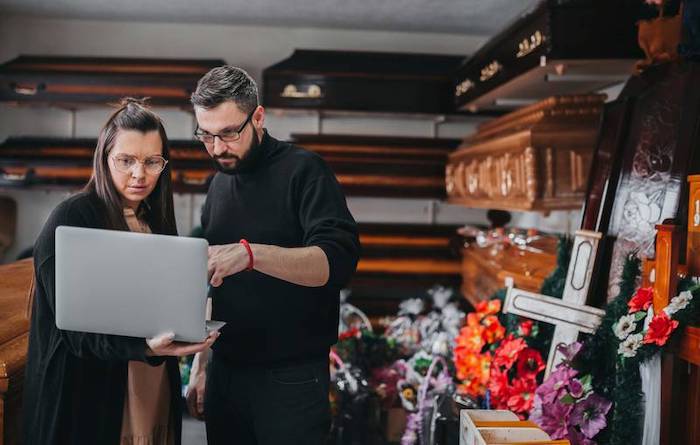How trained companions help people face their last days

From organising living funerals to offering grief support, these specialists aim to create a ‘death-positive landscape’
Arlena Marie from Arizona, Texas, decided to take a leap and ask in Side Hustle Nation, a Facebook group, how to become a “death doula” and market herself as one.
While some were aghast at hearing such a profession exists, others had their interest piqued because, morbid as it sounds, every person on the planet is a potential customer.
The word doula originates from the ancient Greek term doule and translates as a person who serves. Birth doulas are now common and, like midwives, provide services during the birthing journey. A death doula, on the other hand, offers emotional support to people who believe they’re nearing the end of their life and would like to make the days count.
Death is the single certainty in life, yet people continue to fear it instead of preparing for it. I wanted to create a death-positive landscape.
Avril Carr, death doula from Al Ain
While professional moirologists (also known as “crying ladies” in some cultures) have been around for centuries and are hired to wail at funerals, the pandemic has brought death doulas to the fore, as an alternative form of mourner.
Avril Carr is a death doula from Al Ain. She trained as a hypnobirthing teacher, breastfeeding supporter and paediatric sleep consultant, and realised that while a wealth of knowledge is available for the birthing process, the reality of death remains largely ignored.
“We’re suspicious of death, which is interesting because not everyone will give birth, and yet there are countless ways in which mothers and fathers are encouraged to prepare for birth. Death is the single certainty in life, yet people continue to fear it instead of preparing for it. I wanted to create a death-positive landscape,” Carr tells The National.
Having a calm presence to see people through difficult moments and celebrate any glimpses of beauty together is a much-needed trait for death doulas. Carr says the feeling of fulfilment when helping someone with death anxiety is an extremely rewarding experience.
“We care for clients in ways that are personally meaningful and affirming to them. Our focus is assisting people with planning, preparing and processing,” says Francesca Arnoldy, a death doula from Burlington in the US, who also developed the end-of-life doula training programme for The Robert Larner, MD College of Medicine at the University of Vermont.
The most heartbreaking thing is to hear someone say: ‘I wish I had known about you sooner’
Lala Langtry-White, doula
Unlike hospice nurses and other end-of-life support providers, death doulas are emotional companions first and foremost, and must be able to customise their services based on what a person is looking to do to help ease the process.
Planning could involve creating schedules to meet others, having conversations that help with the transition, organising a pre-funeral while the person is still alive and sorting through belongings. Some may even want to make a scrapbook or involve family members to help them through the grief.
The amount of grief and uncertainty the pandemic brought has made many – both the ill and the relatively healthy – want to discuss death and have all their affairs in order, be they practical or emotional.
While stay-at-home measures were enforced in many places across the world, death doulas, like most others, turned to technology and came up with creative ways to virtually bring families together during tough times, making people realise they needed tools and information to bolster their sense of readiness.
Jessica Mendivil, a death doula from California, developed free community calls and training for families to help them cope with the loss of loved ones and general lack of preparedness.
Carr realised that while she missed being physically present, she could still impart training virtually on setting the death space, which included different ways to record one’s legacy and sit vigil when death was near.
Small and Mighty Babies, run by Lala Langtry-White and Joanne Hanson-Halliwell in the UAE, set up and continues to offer an online Love Through Loss community, plus monthly support evenings and access to voluntary bereavement doula support and counselling with The LightHouse Arabia.
It’s a lucrative job, but professionals know it can be a vulnerable and intense journey. Death is still not an easy subject for most people and perhaps never will be, but Langtry-White says the most heartbreaking thing is to hear someone say: “I wish I had known about you sooner.”
Complete Article ↪HERE↩!
